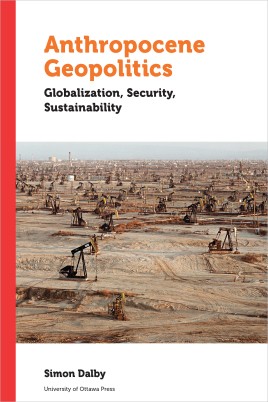 Introducing Simon Dalby
Introducing Simon Dalby
Simon Dalby is a Professor of Geography and Environmental Studies at Wilfrid Laurier University.
His published research deals with climate change, environmental security and geopolitics.
He is co-editor of Achieving the Sustainable Development Goals (Routledge 2019), Reframing Climate Change (Routledge 2016), The Geopolitics Reader (Routledge 1998, 2006), Rethinking Geopolitics (Routledge 1998), and author of Security and Environmental Change (Polity, 2009), Environmental Security (University of Minnesota Press, 2002), and Creating the Second Cold War (Pinter and Guilford, 1990/Bloomsbury 2016).
As an appetizer, a key observation in “Anthropocene Geopolitics: Globalization, Security, Sustainability”:
The politics of security is a matter of choosing which disaster matters most.
Dr Leonhardt van Efferink founded ExploringGeopolitics in 2009. Since then, the website has published over 200 contributions by more than 130 scholars. To celebrate its 10-year anniversary, ExploringGeopolitics has invited its contributors to reflect on geopolitical trends in the 21st century. Two questions play a central role. What was the main trend in the 2010s? And what will be the most important trend in the 2020s?
While Brexit, China’s Belt and Road initiatives, and Donald Trump’s determination to reassert American power in global politics get the headlines, these narratives of geopolitical rivalry are being challenged by a rising series of protest movements insisting that what matters much more in global politics is climate change and the planet wide extinction crisis.
In the last decade xenophobic rhetoric, wall building and nationalist strategies of statecraft have reemerged in ways that challenge global governance in key matters of trade and military rivalries. While Brexit, China’s Belt and Road initiatives, and Donald Trump’s determination to reassert American power in global politics get the headlines, these narratives of geopolitical rivalry are being challenged by a rising series of protest movements insisting that what matters much more in global politics is climate change and the planet wide extinction crisis.
Anthropocene refers to the new geological circumstances wrought by globalization based on fossil fueled industrialization. This newly recognized situation challenges the assumptions of a stable earth as the stage for political rivalry on the big scale.
These views are encapsulated in the discussion of the Anthropocene, the new geological circumstances wrought by globalization based on fossil fueled industrialization. This newly recognized situation challenges the assumptions of a stable earth as the stage for political rivalry on the big scale that have long underlain geopolitical discourse. Hence the title of my new book Anthropocene Geopolitics: Globalization, Security, Sustainability.
Humanity has been scaling up its ecological niche for a long time but scholarship now shows that human actions, as a result of the beginning of urbanization and agriculture, started changing the composition of the atmosphere and warming the planet long ago. Over the last few generations, the so-called ‘great acceleration’ phase of the Anthropocene, this has begun to destabilize the conditions that humanity has known through history.
Earth System Science is now asking: where are the safe limits to human activity, beyond which the earth system will be tipped into new and dangerous configurations?
Earth System Science is now asking: where are the safe limits to human activity, beyond which the earth system will be tipped into new and dangerous configurations? These new ‘planetary boundaries’ sketch out a series of thresholds beyond which humanity shouldn’t venture. These boundaries include nitrogen and phosphorous use, stratospheric ozone depletion, aerosols in the atmosphere and novel entities in a rapidly expanding technosphere.
Traditional notions of sovereignty don’t fit in a rapidly changing geophysical situation.
In stark contrast to this contextualization of imminent dangers to humanity, conventional modes of governance rely on supposedly fixed boundaries and sovereignty over defined territorial spaces. In the case of low lying island states faced with compete elimination by rising seas in the foreseeable future, profound questions about the right to move and the necessity of accommodating people forced to flee now arise. Traditional notions of sovereignty don’t fit in a rapidly changing geophysical situation.
Planning and investment decisions can no longer take fixed environmental conditions as their starting point.
Similar problems occur in many attempts to govern environments using fixed boundaries, whether in parks or other types of ecological reserve. Large scale ecological disruptions mean that ecosystems are moving and conservation practices as well as climate adaptation measures now have to work with this situation. Stationarity assumptions in particular places, where the past is assumed to be a reliable guide as to what weather conditions to expect in future, are giving way to assumptions that non-stationarity is the new human context. Planning and investment decisions can no longer take fixed environmental conditions as their starting point.
Despite the growing recognition of accelerating climate change long standing patterns of equating energy security with reliable supplies of fossil fuel remain entrenched in state governance arrangements.
Despite the growing recognition of accelerating climate change long standing patterns of equating energy security with reliable supplies of fossil fuel remain entrenched in state governance arrangements. Maintaining the existing economic arrangements and the social order of fossil fueled capitalism will have the effect of ensuring ever larger disruptions in future. Remaking the global economy and facilitating economic changes so that renewable energy sources rapidly replace unsustainable ones isn’t happening fast enough to prevent crossing some planetary boundaries.
The numbers of casualties from increasingly artificial disasters are growing which raises further questions about how to rethink security policies. In the case of the meltdown of the Fukushima reactors in Japan natural and artificial vulnerabilities interacted causing multiple insecurities. One suggested solution to climate change is to reduce the amount of sunlight reaching the earth’s surface by solar radiation management. This suggests either that we are already in a disastrous situation, or we are facing the potential disasters of engineering schemes making things worse. The politics of security is a matter of choosing which disaster matters most.
The neoliberal construction of politics as a matter of individual choice, market rationalities and technical matters, constrain political imaginations making novel modes of conduct all the more difficult.
The reassertion of national priorities and the xenophobic rhetoric of populist politicians makes dealing with these insecurities all the more difficult. Simultaneously the neoliberal construction of politics as a matter of individual choice, market rationalities and technical matters, constrain political imaginations making novel modes of conduct all the more difficult. This is happening just when discussions of the Anthropocene are showing that it’s the interconnections across many boundaries that provide the appropriate context for thinking about climate change, extinction and other ecological disruptions as well as the disfunctions of globalization.
The Anthropocene idea simultaneously suggests the scale of current transformations, the necessity of acting quickly on extinction and climate change, and the interconnections between people and ecological systems. This is about scaling up the insights of political ecology, and understanding the global politics of shaping landscapes and resource. The Anthropocene concept has the potential to be very useful politically if it is understood in terms of these changes on a geological scale.
Convincing governments and investors that their future security is dependent on a flourishing biosphere, rather than the continued combustion of fossil fuels, is now the key task for Anthropocene geopolitics.
This is a very different geopolitics from the traditional modes of imperial rivalry; now the antagonists are striking school children and activists trying to divest funds from the industries whose activities are making ecological matters worse. Convincing governments and investors that their future security is dependent on a flourishing biosphere, rather than the continued combustion of fossil fuels, is now the key task for Anthropocene geopolitics.
New Book: Anthropocene Geopolitics: Globalization, Security, Sustainability
This contribution is based on the book Anthropocene Geopolitics: Globalization, Security, Sustainability by Simon Dalby.
It was published in February 2020 by University of Ottawa Press.

